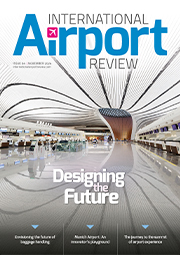Is blockchain the solution to enhancing baggage tracking?
- Like
- Digg
- Del
- Tumblr
- VKontakte
- Buffer
- Love This
- Odnoklassniki
- Meneame
- Blogger
- Amazon
- Yahoo Mail
- Gmail
- AOL
- Newsvine
- HackerNews
- Evernote
- MySpace
- Mail.ru
- Viadeo
- Line
- Comments
- Yummly
- SMS
- Viber
- Telegram
- Subscribe
- Skype
- Facebook Messenger
- Kakao
- LiveJournal
- Yammer
- Edgar
- Fintel
- Mix
- Instapaper
- Copy Link
Posted: 20 October 2020 | Chris Au Young | No comments yet
Chris Au Young, Airport Authority Hong Kong’s General Manager, reviews the world’s first-ever study that explored the potential of blockchain to provide a single source of truth for checked baggage.


According to global statistics1, 24.8 million pieces of checked baggage worldwide were lost in 2018 alone; not only inconveniencing passengers, but also costing the airport transportation industry around $2.4 billion. To tackle the problem, Hong Kong International Airport (HKIA) teamed up with the International Air Transport Association (IATA), London Heathrow Airport (LHR), Cathay Pacific (CX) and IBM to create and test a potential global blockchain solution that provides end‑to‑end baggage tracking. The study – which was the world’s first – found that blockchain provided a single source of truth for checked baggage, enabling real-time data-sharing among multiple stakeholders in a cost-effective way.
An opportunity to solve the mishandled baggage issue and save the industry billions
One of the most disheartening experiences for passengers is waiting at an airport baggage carousel after their flight and finding out their baggage was mishandled, or worse, missing altogether. This is not just a headache for the passenger but, due to insufficient transparency and a lack of real-time information, it is a huge challenge for all the airports, airlines and ground‑handling agents involved in finding the lost baggage. It gets even more complicated when insurance and claims need to be processed.
The global baggage mishandling rate has already dropped by more than 47 per cent between 2018 and 2007. Statistically, currently, approximately one per cent of the total number of checked baggage worldwide gets lost.
World’s first study on blockchain application for baggage tracking
As one of the world’s busiest airports, HKIA handled more than 70 million passengers in 2019 and around 90,000 pieces of departing baggage per day. HKIA is one of the pioneer airports that adopted RFID technology for baggage handling in 2005. With the use of RFID, the baggage mishandling rate at HKIA is much lower than the industry average and has enhanced operational efficiency and helped ensure accurate baggage tracking.
Following HKIA’s successful RFID experience, HKIA hypothesised that a new global baggage tracking solution enabled by blockchain technology could reduce the incidence of mishandled baggage throughout the entire journey of the baggage from the airport of origin to the destination, and subsequently initiated a study in partnership with IATA, LHR, CX and IBM between October 2019 and June 2020.
Blockchain – a technology best known for enabling the existence of cryptocurrencies – has successfully improved operations and brought about great transformations in multiple industries, including shipping, hospitality, banking, healthcare and supply chain management. It is essentially a decentralised digital ledger of transactions spread across a network of computers. By design, every single transaction status is updated for all parties, everywhere, within minutes, with full traceability back to the point of origin. The very nature of blockchain appeared to be the perfect way to improve baggage tracking in the global aviation industry, potentially solving our traditional pain points surrounding the lack of transparency to a trusted source of the bag journey history and the expensive cost for middlemen who charge for bag data transfer.
The study partners built a pilot blockchain platform with multi-cloud capabilities, creating a search portal with proactive alerts and identifying smart contract opportunities. The platform was then tested for both direct flight scenarios between HKG and LHR, and interline flight scenarios between HKG, Sydney, LHR and Taipei, collecting feedback from the airports’ and CX’s baggage operators on the handling of over 50,000 pieces of passenger baggage.
The value of a single source of truth
The study found that blockchain could provide a viable solution for the industry’s baggage tracking challenge. Since every single transaction made on a piece of checked baggage has to be approved by a network of thousands, or even millions, of computers, this essentially removed human involvement in the verification process, resulting in less room for error and a more accurate record of information. The pilot blockchain platform served as a single source of truth on the whereabouts of a piece of checked baggage. Below are some of the learnings from the pilot platform.
End-to-end baggage tracking with high transparency
Blockchain provides a consistent and reliable record of end-to-end tracking of the baggage journey by linking baggage messages shared by different participants, including airports, airlines and ground handling agents. With this high information transparency, airlines and passengers are able to check the latest status of the baggage with ease. For example, if a piece of baggage was short-shipped, the passenger would know about it earlier and be able contact the airlines promptly for help instead of having to wait at the reclaim carousel to find out about the issue. The airlines would be able to identify the exact location of the short-shipped baggage and deliver it to the passenger as quickly as possible.
Auditability and liability demarcation
Since a blockchain platform provides a single source of truth, the status of the checked baggage at each tracking point would always be listed clearly, making it much easier to determine the custodian liability when a piece of baggage is mishandled. Airlines and ground handlers could also automate the billing and claims settlements, which would enhance operational efficiency and avoid unnecessary disputes. The claiming process would be much more efficient from the claimant’s point of view as well.
Eliminates the need for middlemen
Currently, airports, airlines and ground handlers have to share baggage messages with each other through middlemen. Blockchain’s open technology would enable all stakeholders to automatically receive the latest data when baggage passes through each tracking point. This would cut out the need for middlemen and subsequently reduce costs. The open technology could also effectively drive down the cost for industry adoption, which will hopefully facilitate collaboration and the implementation of a set of common global standards.
Enhancing resources allocation and facility planning
Blockchain’s reliable baggage tracking record would enable the aviation industry to enhance operational efficiency and resource allocation with the use of big data analysis. For example, the airport community would be able to identify routes that tend to have short-shipped baggage by analysing baggage records and allocating additional resources to solve their short-shipping issues.
Smart airports for the future need to continuously innovate
The pilot blockchain technology study will now be scaled up and involve more global partners. The findings will also be shared with the IATA Baggage Working Group (BWG) and Baggage Information Exchange (BIX) sub-groups. At HKIA, we believe that the global aviation industry will continue to benefit from innovations, partnerships and knowledge exchange, especially in respect to smart airport development, which will make the travel experience more pleasant for passengers worldwide.
Reference
1. SITA, 2019 Air Transport Industry Insights – The Baggage Report


The rest of this content is restricted - login or subscribe free to access


Why subscribe? Join our growing community of thousands of industry professionals and gain access to:
- bi-monthly issues in print and/or digital format
- case studies, whitepapers, webinars and industry-leading content
- breaking news and features
- our extensive online archive of thousands of articles and years of past issues
- ...And it's all free!
Click here to Subscribe today Login here
Issue
Related topics
Airside operations, Baggage handling, Blockchain, Passenger experience and seamless travel, Security, Terminal operations


















